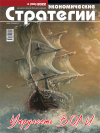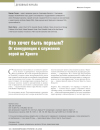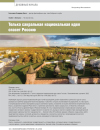Who Wants to be the First? From Competition to Service by Faith in Christ
DOI: https://doi.org/10.33917/es-4.184.2022.128-133
The article dwells on spiritual prerequisites and weaknesses of the modern conception of competition, as well as the possibility of transforming it from the point of view of Truth — the Orthodox faith in Jesus Christ, the Son of God.
Источники:
1. Porter M. Konkurentsiya [Competition]. Moscow, Vil’yams, 2005, p. 30.
2. Khazin M.L. Mir na poroge novykh vremen [World on the Threshold of New Times]. World Crisis. 2012, July, 22, available at: http://worldcrisis.ru/crisis/1000041.
3. Sorokin P.A. Tainstvennaya energiya lyubvi [Mysterious Energy of Love]. Sotsiologicheskie issledovaniya, 1991, no 8, p. 124.
4. Iustin (Popovich), prepodobnyi. Filosofskie propasti [Philosophical Abysses]. Moscow, 2005, p. 263.
5. Brandenburger А.М., Nalebuff В.J. Co-Opetition: A Revolution Mindset That Combines Competition and Cooperation. N. Y., 1996.
6. Deming U.E. Novaya ekonomika [New Economy]. Moscow, 2006.
7. Polterovich V.M. Pozitivnoe sotrudnichestvo: faktory i mekhanizmy evolyutsii [Positive Collaboration: Factors and Mechanisms of Evolution]. Voprosy ekonomiki, 2016, no 11, pp. 5–23.
8. Vazhenina I.S., Vazhenin S.G. Konkurentnoe sotrudnichestvo territorii v sovremennom ekonomicheskom prostranstve [Competitive Cooperation of Territories in the Modern Economic Space]. Ekonomika regiona, 2020, no 2, pp. 406–419.
9. Lalu F. Otkryvaya organizatsii budushchego [Discovering Organizations of the Future]. Moscow, 2017, p. 242.
10. Semenchuk V.V. Biznes-khaking. Ishchi uyazvimosti konkurentov — vzryvai rynok [Business Hacking. Look for Competitors’ Vulnerabilities — Blow up the Market]. Moscow, 2019, p. 5.
11. Shlyakhov A.L. Top-menedzher mafii. Polnyi kurs po likvidatsii konkurentov [Mafia Top Manager. Complete Course on Eliminating Competitors]. Moscow, 2012, p. 27.
12. Kropotkin P.A. Vzaimnaya pomoshch’ sredi zhivotnykh i lyudei kak dvigatel’ progressa [Mutual Aid Among Animals and People as an Engine of Progress]. Moscow, 2018.
13. Glaz’ev S.Yu. Nravstvennye nachala v ekonomicheskom povedenii i razvitii — vazhneishii resurs vozrozhdeniya Rossii [Moral Principles in Economic Behavior and Development — the Most Important Resource for Russia’s Revival]. Ekonomika i obshchestvennaya sreda: neosoznannoe vzaimovliyanie. Moscow, 2008, pp. 420, 421.
14. Obert T.B. Teoriya konkurentsii [Competition Theory]. Ucheb. posobie. Saratov, 2014, p. 11.
15. Katasonov V.Yu. Kapitalizm. Istoriya i ideologiya “denezhnoi tsivilizatsii” [Capitalism. History and Ideology of “Monetary Civilization”]. Moscow, 2015, p. 832.
16. L’vov D.S. Kakaya ekonomika nuzhna Rossii? [What Economy Does Russia Need?]. Ekonomicheskie i sotsial’nye peremeny v regione, 2003, no 20, p. 15.
17. Chan Kim V., Moborn R. Strategiya golubogo okeana [Blue Ocean Strategy]. Moscow, 2016, p. 14.
18. Bulgakov S.N. Filosofiya khozyaistva [Philosophy of Economy]. Moscow, 2009, pp. 173, 174.
19. Druker P.F. Effektivnyi rukovoditel’ [Effective Leader]. Moscow, 2020, p. 22.




